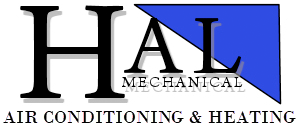Air conditioning (AC) systems are widely used to provide comfortable and controlled indoor environments in both residential and commercial settings. Understanding common AC industry terms can help users make informed decisions, communicate effectively with professionals, and maintain their systems. Today, we at Hal Mechanical would like to share some of the most frequently encountered AC industry terms you are likely to hear.
What is the Technical Terms for HVAC?
Air Conditioning: The process of controlling temperature, humidity, and ventilation to create a comfortable indoor environment.
HVAC: Heating, Ventilation, and Air Conditioning. Refers to the system that provides both heating and cooling functions, including the air conditioning unit, ductwork, and controls.
BTU: British Thermal Unit. The unit used to measure the amount of heat energy required to raise or lower the temperature of a substance. In AC, it measures cooling capacity.
SEER: Seasonal Energy Efficiency Ratio. It represents the cooling output of an AC unit divided by the energy it consumes over an entire cooling season. Higher SEER ratings indicate greater efficiency.
EER: Energy Efficiency Ratio. Similar to SEER, but it measures the cooling output of an AC unit divided by the energy it consumes under specific conditions (usually 95°F outdoor temperature).
Ton: A unit of cooling capacity. One ton is equal to 12,000 BTU per hour.
Compressor: The central component of an AC system that pumps refrigerant through the system, increasing its pressure and temperature.
Condenser: The outdoor unit of an AC system where heat is released into the outdoor air as refrigerant condenses from a gas to a liquid.
Evaporator: The indoor unit of an AC system where refrigerant absorbs heat from indoor air, causing it to evaporate from a liquid to a gas.
Refrigerant: A chemical substance used in AC systems to transfer heat between the indoor and outdoor units. Common refrigerants include R-410A and R-22.
Ductwork: The network of channels that distributes conditioned air throughout a building.
Thermostat: A device that controls the temperature of an AC system. It senses the indoor temperature and signals the system to turn on or off to achieve the desired temperature.
Air Handler: The indoor unit that circulates conditioned air throughout the ductwork. It contains the blower fan, evaporator coil, and filter.
Air Filter: A component that traps dust, dirt, and other airborne particles to improve indoor air quality and protect the AC system.
Humidity: The amount of moisture present in the air. AC systems can control humidity levels to enhance comfort and prevent excessive moisture or dryness.
Zoning: Dividing a building into different areas or zones with separate temperature controls. This allows for personalized comfort and energy savings.
Load Calculation: The process of determining the heating and cooling requirements of a building based on factors like square footage, insulation, occupancy, and climate.
Airflow: The movement of air through the AC system, including supply air (conditioned air delivered to the space) and return air (air drawn back into the system for reconditioning).
Heat Pump: An AC system that can reverse its refrigeration cycle to provide both heating and cooling functions, making it efficient year-round.
AC Maintenance: Regular servicing and upkeep of an AC system to ensure optimal performance, energy efficiency, and prolong its lifespan.
Central Air Conditioning Services in Aliante, Centennial, Desert Shores, Eldorado, Enterprise, Green Valley Ranch, Henderson, Lone Mountain Village, North LV, Peccole Ranch, Paradise, Silverado Ranch, Spring Valley, Summerlin, Sunrise Manor, Tuscany Village, Whitney, Winchester & Las Vegas Nevada
Understanding these common AC industry terms empowers users to make informed decisions about their systems, communicate effectively with technicians, and maintain a comfortable indoor environment. When you need air conditioning services in the Las Vegas Valley, call Hal Mechanical and let us assist you!






